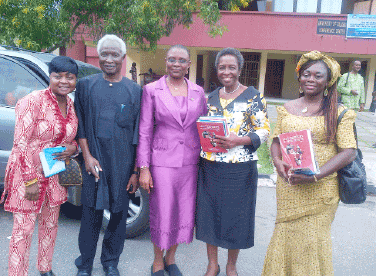
University of Calabar (UNICAL), Cross River State, was agog recently to celebrate two literary icons: Professor Elechi Amadi, author of The Concubine, The Great Ponds and a host of other remarkable novels who turned 80 on March 12; and Professor Ebele Eko, poet, eminent scholar, former deputy vice-chancellor of UNICAL and the biggest authority on Amadi’s works, who clocked 70 and was celebrated in a variety of activities on her retirement.
Betty Abah (left); Prof. Elechi Amadi (2nd left); Prof. Ini Uko of University of Uyo (middle); Prof. Ebele Eko (2nd right); and Amadi’s wife, Priye, at ICALELThe annual International Conference on African Literature and the English Language (ICALEL) was titled ‘Ebele Eko at 70’, in honour of a woman who, since 1977 when she resumed at the English and Literary Studies (ELS) department from the United States of America, has made the department and the school proud.
ICALEL, on May 6, started the event with the theme ‘African Literature, the English Language and the Environment’. It featured paper presentations on the theme, a gala night including a command performance of Amadi’s play, The Woman of Calabar, by ELS students, to the admiration of Rivers State-based Prof. Amadi and others. It also attracted several people in the academia and beyond, and, like many literary conferences, it was prone to possibilities.
A delegate at the on-going national conference, Professor Godini Darah of the Department of English and Literary Studies, Delta State University (DELSU), gave the keynote address, stoking the first fire of controversy in his presentation whose theme was on ‘Literature and the Environment’.
But Darah, who spoke mostly extempore, leaving many astounded with his new insight, especially in biblical history, asserted that Egypt was the cradle of civilisation.
Also at the event were: Dr. Emmanuel Adedun, one of Eko’s many proteges and Betty Abah, Lagos-based writer and activist, who gave a preview of her upcoming biography on Eko titled Mother of Multitudes.
ICALEL, founded over three decades ago by Professor Ernest Emenyonu (now U.S.-based) and others, including the retiring Eko, is no stranger to controversies, as it draws the best literary and sometimes most unconventional writers from across Africa and beyond and was a major global gathering, especially in the 1980s.













